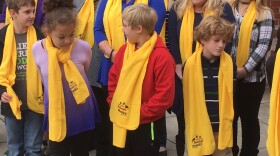The Education Savings Account is a new state program that allows families of qualified children with disabilities to apply for a taxpayer-funded account to pay for educational expenses while attending a private school. The savings account falls under the umbrella of North Carolina's expanding school choice scholarships because it can be used by students who attend public schools to pay for private school tuition.
Here's a look at five questions about the measure, which was made law in 2017.
1. How is the ESA a savings account?
The program is not a savings account in the traditional sense. Families do not put their own money on the account. Rather, those selected will receive $9,000 and a debit card from the state to be used to make educational purchases. Any money not spent in a given year can be saved and used in later years.
2. Who is eligible for one?
Students with either a learning or a physical disability can apply if they have already gone through the process of qualifying for an individualized education plan at their public school.
The application is only open to students currently attending a public school. There are exceptions to that for students entering kindergarten or first grade, who have an active-duty military parent, are in foster care or were recently adopted.
Update: Applications now open to qualified students enrolled at private schools. Related story: Legislature Slips School Voucher Change In Class Size Bill
Students who apply will be placed in a lottery with enough funding for 300 recipients. Public school students must begin attending a private school full or part-time in order to qualify to receive the funds if selected.
3. What will the education savings account pay for?
Eligible expenses on the account include tuition, fees and required textbooks at a private school; tutoring and teaching services by an accredited organization; fees for services provided by a public school, including individual classes and extra-curricular activities; educational therapy by an accredited practitioner; and approved educational technology.
4. How does someone apply for an Education Savings Account?
Online applications opened Feb. 1 on the North Carolina State Education Assistance Authority's website. Families must show that their child qualifies for an individualized education plan and that he or she meets eligibility requirements. The priority deadline is March 1 and the Authority will select students by lottery. Awards will be announced in April.
5. How is the program being monitored?
Critics of the program say it is vulnerable to abuse and misuse of funds. An audit of a similar program in Arizona found cases of fraud. The advocacy group Public School Forum of North Carolina has raised concerns about the accountability of the new education savings accounts.
In an emailed statement, The Forum's Director Keith Poston said the state should support children with special needs and disabilities, but the top priority should be for public schools to have the resources to do so.
"Our public schools are accountable, transparent and obligated to serve every child," Poston said. "We are simply concerned about the proliferation of programs that lack even minimal accountability measures shifting funds away from public education."
The North Carolina State Education Assistance Authority (NCSEAA) will administer the savings accounts. The Authority's director of grants Kathryn Marker said that while protecting the ESA program from fraud is not foolproof, the agency has several safety measures. The agency will require electronic approval of certain purchases and families will submit receipts and quarterly reports. Funds will also be disbursed quarterly, and any issues would need to be resolved before the next quarter. Any private schools receiving a portion of the scholarship must register with the NCSEAA.




